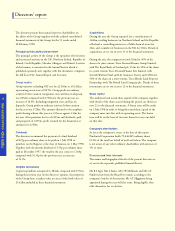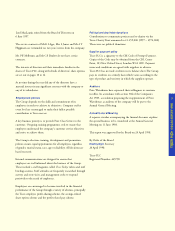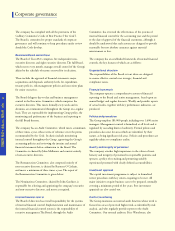Tesco 1998 Annual Report Download - page 10
Download and view the complete annual report
Please find page 10 of the 1998 Tesco annual report below. You can navigate through the pages in the report by either clicking on the pages listed below, or by using the keyword search tool below to find specific information within the annual report.
Corporate governance
8
The company has complied with all the provisions of the
Cadbury Committee’s Code of Best Practice (‘the Code’).
The Board is committed to proper standards of corporate
governance and will continue to keep procedures under review
should the Code develop.
Board and Board committees
The Board of Tesco PLC comprises five independent non-
executive directors and eight executive directors.The full Board,
which meets every month, manages overall control of the Group’s
affairs by the schedule of matters reserved for its decision.
These include the approval of financial statements, major
acquisitions and disposals, authority levels for expenditure,
treasury policies, risk management policies and succession plans
for senior executives.
The Board delegates day-to-day and business management
control to the Executive Committee, which comprises the
executive directors. This meets formally every week and its
decisions are communicated throughout the Group on a regular
basis. They are responsible for implementing Group policy, the
monitoring and performance of the business and reporting to
the full Board thereon.
The company has an Audit Committee, which meets a minimum
of three times a year, whose terms of reference cover the points
recommended by the Code. Its duties include monitoring
internal control throughout the Group, approving the Group’s
accounting policies and reviewing the interim and annual
financial statements before submission to the Board. The
Committee is chaired by John Melbourn and consists entirely
of non-executive directors.
The Remuneration Committee, also composed entirely of
non-executive directors, is chaired by Baroness O’Cathain,
and meets a minimum of three times a year. The report of
the Remuneration Committee is given below.
The Nominations Committee, chaired by John Gardiner, is
responsible for selecting and appointing the company’s executive
and non-executive directors, and meets as required.
Internal financial control
The Board of directors has overall responsibility for the systems
of internal financial control. Implementation and maintenance of
the internal financial control system is the responsibility of
executive management.The Board, through the Audit
Committee, has reviewed the effectiveness of the systems of
internal financial control for the accounting year and the period
to the date of approval of the financial statements, although it
should be understood that such systems are designed to provide
reasonable but not absolute assurance against material
misstatement or loss.
The company has an established framework of internal financial
controls, the key features of which are as follows:
Organisational structure
The responsibilities of the Board set out above are designed
to ensure effective control over strategic, financial and
compliance issues.
Financial framework
The company operates a comprehensive system of financial
reporting to the Board and senior management, based upon an
annual budget and regular forecasts. Weekly and periodic reports
of actual results, together with key performance indicators, are
produced.
Policies and procedures
The Group employs 185,000 people including over 1,600 senior
managers. Management control is formalised at all levels and is
regulated by cascading limits of authority. Formal policies and
procedures also exist for areas which are identified, by their
nature, as being significant risk areas. Policies and procedures are
regularly subject to compliance audits.
Quality and integrity of personnel
The company attaches high importance to the values of trust,
honesty and integrity of personnel in responsible positions and
operates a policy of recruiting and promoting suitably
experienced personnel with clearly defined accountabilities.
Investment appraisal
The capital investment programme is subject to formalised
review procedures with key criteria requiring to be met. All
major initiatives require business cases to be prepared, normally
covering a minimum period of five years. Post investment
appraisals are also carried out.
Control monitoring
The Group maintains an internal audit function whose work is
focused on areas of perceived highest risk, as identified by risk
analysis, and who regularly provide reports to the Audit
Committee. Our external auditors, Price Waterhouse, also























